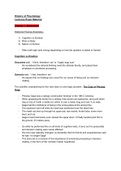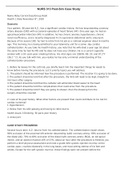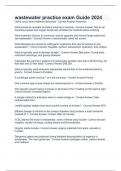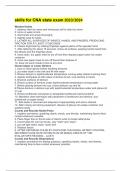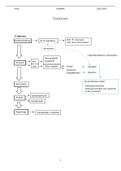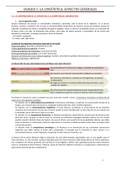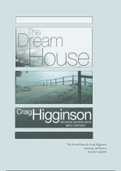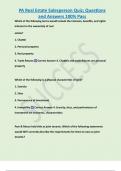Lectures Exam Material
Chapter 1 : Mechanism
Historical Themes Examples :
1) Cognition vs Emotion
2) Mind vs Body
3) Nature vs Nurture
- Often both right (and wrong) depending on how the question is asked or framed
Cognition vs Emotion
Descartes said : ‘I think, therefore I am’ or ‘Cogito ergo sum’
- He considered the rational thinking mind the ultimate faculty, and placed less
emphasis on emotional processing
Damasio said : ‘I feel, therefore I am’
- He argues that our feelings are crucial for our sense of being and our decision
making
The scientific underpinning for this view rests on one tragic accident : The Case of Phineas
Gage
- Phineas Gage was a railway construction foreman in the 19th C America.
- When preparing the terrain for a railway, they would use explosives, and push down
clay on top of it with a metal rod, which is over a meter long and over 3 cm wide.
- Gage had the misfortune of being in the wrong place at the wrong time
- The explosive went off while his head was positioned over the blast hole.
- The metal rod shot up through his upper jaw, eye socket, frontal lobe, some more
skull, and out.
- Gage’s head had barely even slowed the spear down. It finally landed point first in
the ground, 25 meters away
- So while he performed fine on all kinds of cognitive tests, it turns out his personality
and decision making were sorely affected.
- His mind was radically changed, so decidedly that his friends and acquaintances said
he was “no longer Gage”
- This story led to a revision of the importance of emotional processing in decision
making, in the form of the ‘somatic marker hypothesis’
,Mind vs Body
- The central question lies in how the rich and meaningful personal experience we
have can be represented in something that is “merely” flesh and blood.
- This also touches upon issues related to predetermined cause and effect, and free
will.
Descartes said that :
- Mind and body are separable
- They constitute different substances
Different viewpoints :
1. Body and mind are separate (dualism)
2. Body and mind consist of one whole (monism)
Two extreme versions of the latter are :
1. Everything consists of matter (realism)
2. Mind is the basis of everything (idealism), e.g. Plato
Nature vs Nurture
- Innate vs acquired
- Genes vs environment
- Instinct vs thought
Heart of the debate :
- How do we attain knowledge?
- What causes differences between people?
Rationalism :
- Knowledge is innate (the same for everybody)
- E.g. Plato
Empiricism :
- All knowledge comes from experience
The dichotomy between nature and nurture is largely a false one. A lof of our genetic
building plan is based on, and relies on, regularities in our evolutionary environment. Such
developmental processes are what we call experience-expectant. They develop the same in
most people, because most people have those factors in their environments (like having
other humans around, or having light hit their retina and have the signals from that reach
,their brains). However, if that experience, that nurture, disappears, these genetic
mechanisms falter. The info in our genes and the influence in our environment are in
constant interaction, and anyone who tries to reduce that to a “this is caused by genetics” or
“this is caused by the environment” is missing the point. Even conclusions such as “this is
30% genetic and 70% environment driven” are problematic, because they do not do justice
to the interaction between the two, and only apply to the variance in genetics and in an
environment that’s present in the studied population.
Most Important Developments in the Conceptual History of Psychology From 1600
- Shows how the focus on different topics in psychology has shifted over time, often
revisiting topics after they have mostly lay dormant for a while.
- We start at 1600, because this is when the attempt at understanding HOW the mind
works started advancing.
- We end in 1950, because that’s roughly when psychology turned into an actual
science, and it branched out into many subfields and specializations
After 1600: End of Medievalism, Start of Mechanism
Big Timeline :
● Prehistory
● Ancient Egypt
● Greeks
● Romans
● Dark ages (aka “Europe sucked”)
● Renaissance & enlightenment
● Modern era
, Medieval Society and Science
Society :
- Fixed order
- Natural place
- Traditions
- Patriarchal
Science :
- Everything has natural position / relation to other things
- Applies to objects on earth
- And the entire universe
The reason we start with the 17th century, is because until then, the political climate in
Europe was not very conducive to understanding the world. Things were as they should be,
and were not to be questioned, because this would run counter to “Divine authority”.
“Philosophy is questions that may not be answered. Religion is answers that may not be
questioned.”
This may sound semi-joking at times, but for much of medieval history, this was literal truth.
Anyone who dared question the natural order of things was considered a heretic, dangerous,
and often put to death, their books burned.
Beliefs About What Counts as Scientific are Influenced by Society
A New Universe (~1600) : Mechanism
Society : Science :
Mechanism Mechanism
Free Market Capitalism How does it work?
The rise of mechanism in society and in science went hand in hand. The development of
capitalism made knowledge and the ability to quantify and predict phenomena a valuable
commodity, resulting in a renewed appreciation for science, technology and engineering.
Market Society: Mechanism
Market: a self-regulating mechanism
- Relationship to science : Quantification
- Value ---> quantity vs quality


